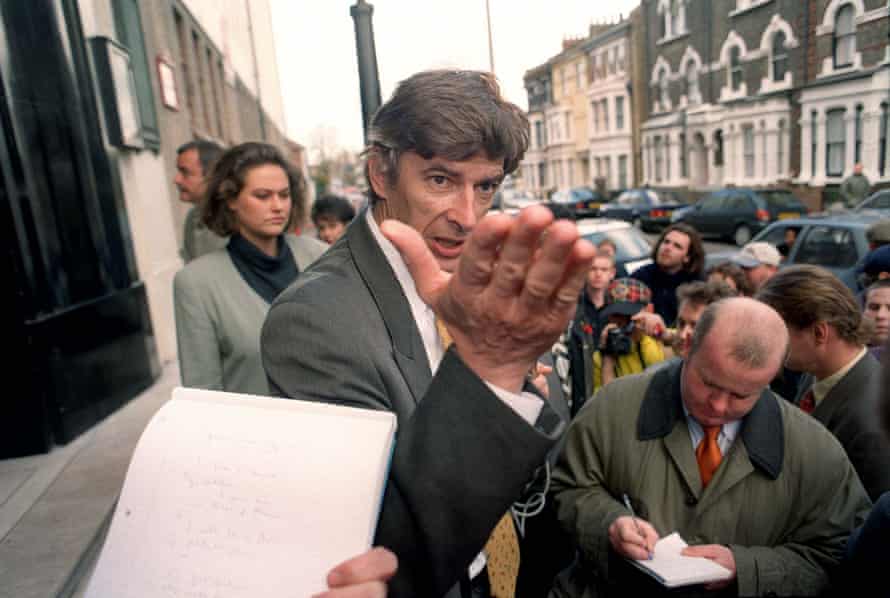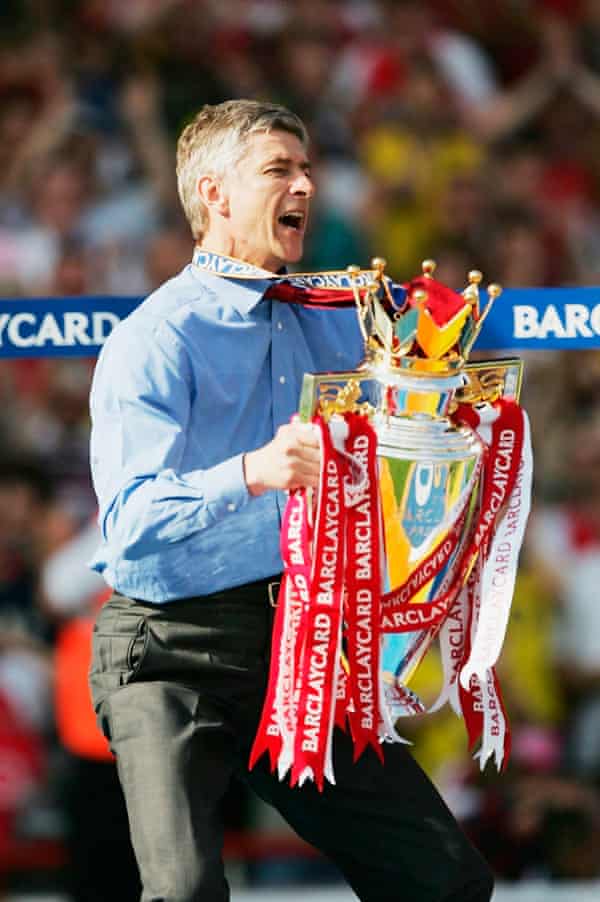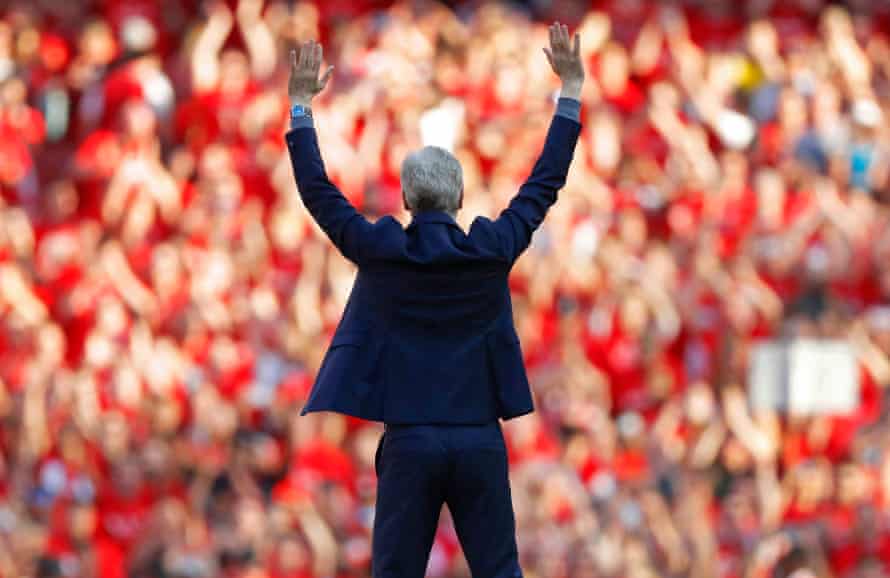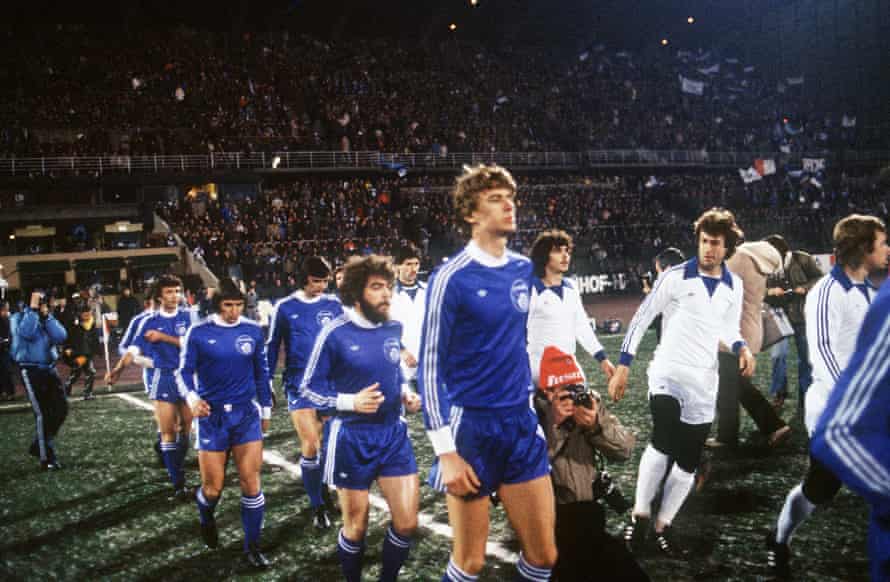Reading: ‘When I lose it, I lose it in a dangerous way’: Arsène Wenger on sweat, suffering and selfishness
His father, Alphonse, would never tell his son: ‘Well done!’, only: ‘You can do better’
“ There are early important things in life – artwork, for exercise – that I didn ’ triiodothyronine research at all, ” he tells me, when I ask what ’ s so chilling about this single-mindedness. “ possibly lone geniuses can be successful in many multi-territorial things. I was not a flair ; I had to dedicate my whole energy to one thing. ” But there ’ s no deny that it worked. When Wenger came to Arsenal in 1996, the affect was about immediate. He won the Premier League title and FA Cup in his second season, becoming the first foreign coach to win the doubly, then did the lapp again a few years by and by. His crowning accomplishment was in 2003/04, however, when Arsenal became known as the Invincibles after winning the Premier League title without losing a single game. even his greatest rival, Sir Alex Ferguson, had to give Wenger his due, commenting : “ The accomplishment stands aside, it stands above everything else. ” Arsenal still hold the record for the longest unbeaten run in league history, at 49 matches . Arsène Wenger holds an ad-lib press conference on the steps outside Highbury in 1996. Photograph: Colorsport/Shutterstock Two years before the Invincible season, Wenger had announced that he thought his team could do it – and been mocked for saying so. “ If you don ’ deoxythymidine monophosphate set high targets, ” he says now, “ you don ’ thymine push people to go equally far as they could be. ” But there were obstacles off the lurch vitamin a well as on. Wenger was one of the first alien managers in the league, and his arrival contributed to English football ’ mho transformation from an inward-looking monoculture to the global game it is today. The press was doubting – “ Arsène who ? ” asked one ill-famed Evening Standard headline. Winning games turned that agnosticism into hostility, “ a mass of negativity because he was a foreign coach and he was doing things that are different, ” Arsenal legend Ian Wright claims in the documentary. It climaxed with false reports of Wenger ’ south dismissal and rumours that a newspaper was set to print a highly compromise floor about his private life. Wenger held an impromptu press conference on the steps outside Highbury, Arsenal ’ s stadium at the time, and said he was ready to refute the lies. No such history was ever published. “ I had adequate maturity to deal with it, ” says Wenger. “ I think I have one timbre, possibly, when I ’ m in adversity : I can concentrate on what is authoritative and what is less authoritative. At that stage, I felt surprised, but I felt : ‘ Let ’ s do what I think I can do, which is to manage a football team. ’ So I was not destabilised. ”
Arsène Wenger holds an ad-lib press conference on the steps outside Highbury in 1996. Photograph: Colorsport/Shutterstock Two years before the Invincible season, Wenger had announced that he thought his team could do it – and been mocked for saying so. “ If you don ’ deoxythymidine monophosphate set high targets, ” he says now, “ you don ’ thymine push people to go equally far as they could be. ” But there were obstacles off the lurch vitamin a well as on. Wenger was one of the first alien managers in the league, and his arrival contributed to English football ’ mho transformation from an inward-looking monoculture to the global game it is today. The press was doubting – “ Arsène who ? ” asked one ill-famed Evening Standard headline. Winning games turned that agnosticism into hostility, “ a mass of negativity because he was a foreign coach and he was doing things that are different, ” Arsenal legend Ian Wright claims in the documentary. It climaxed with false reports of Wenger ’ south dismissal and rumours that a newspaper was set to print a highly compromise floor about his private life. Wenger held an impromptu press conference on the steps outside Highbury, Arsenal ’ s stadium at the time, and said he was ready to refute the lies. No such history was ever published. “ I had adequate maturity to deal with it, ” says Wenger. “ I think I have one timbre, possibly, when I ’ m in adversity : I can concentrate on what is authoritative and what is less authoritative. At that stage, I felt surprised, but I felt : ‘ Let ’ s do what I think I can do, which is to manage a football team. ’ So I was not destabilised. ” Arsenal director Arsène Wenger lifts the Premiership trophy at Highbury in 2004. Photograph: Clive Mason/Getty Images Sport There was a grade culture chemise as players started drifting in from the continent, and individual performances were bolstered by revolutionary concepts such as a goodly diet and not following Ray Parlour ’ south lead by sinking 10 pints the night before a meet. Wenger transformed Arsenal ’ s style of play from one of base hit first to a more expressive, improvisational attack game – which at its bill was christened “ Wengerball ”. And he brought composure to the dress board. Wright says Wenger was the first gear director he had who didn ’ thymine randomly “ blast you down ” at half-time. “ I felt always that the most authoritative thing is that you get a effective diagnosis of what ’ s going on, ” Wenger says. “ The hairdryer method [ screaming at your players ] is more to get your frustrations out – and it ’ s not identical effective. If you do that every week, people adapt to the behavior of their director. I thought it ’ south more important to be kind, master the situation and give an indication of what you should do. “ I thought : ‘ What is the most effective, not what is the most spectacular ? ’ I have a identical passionate character ; when I lose it, I lose it in a dangerous means. So I learned to control myself. Because you can make mistakes when you are out of operate that you can not repair. ” It bred a fierce commitment in his players ; former Arsenal midfielder Emmanuel Petit says he would have climbed Everest without oxygen for him. Others have spoken about how Wenger was a father figure to them. “ I believe that players have to know that you love them, ” Wenger says. “ The players must feel at the start that you can be demanding, but arsenic good they must believe that, deeply, you want to help them. ” He led by example and prepared for games as if he himself was playing. He wouldn ’ thymine go out for 48 hours before a match ( “ Life in cardinal London ? I can watch that on television ” ), and knew only the triangle made by the educate kernel, stadium and his home in north London, where he lived with his wife, Annie Brosterhous, a erstwhile basketball musician ( from whom he separated in 2015 ) and daughter Léa. His devotion to the bet on – not to mention his bespectacled, scholarly appearance and academic background – earned him the nickname Le Professeur. But, for all his military reserve, Wenger was never the most gracious in kill. He thinks this profound hatred of fall back may have started in the greenwich village where he was raised – Duttlenheim, near the german edge in Alsace, north-eastern France – at the local anesthetic Catholic church. “ I was not the most patient child, ” he says, remembering how he would be forced to kneel in front of the wholly congregation after talking during services. Mass, being in Latin, was of little sake. “ People went to my beget ’ south public house and told him that I ’ vitamin d been kneeling in front of everybody again. That ’ sulfur possibly where my hate for losing comes from : being humiliated. ” Wenger was born in 1949, the youngest of three children. His earliest memories – away from shame – are of the football pitch and the greenwich village bistro his parents owned. It was used as a clubhouse for the local team ; they ’ five hundred draw changed there then make their way to the equal. Watching the men interact in the bar and studying their behavior was “ a great psychological experience for a boy ” and kindled his lifelong fascination with the human mind .
Arsenal director Arsène Wenger lifts the Premiership trophy at Highbury in 2004. Photograph: Clive Mason/Getty Images Sport There was a grade culture chemise as players started drifting in from the continent, and individual performances were bolstered by revolutionary concepts such as a goodly diet and not following Ray Parlour ’ south lead by sinking 10 pints the night before a meet. Wenger transformed Arsenal ’ s style of play from one of base hit first to a more expressive, improvisational attack game – which at its bill was christened “ Wengerball ”. And he brought composure to the dress board. Wright says Wenger was the first gear director he had who didn ’ thymine randomly “ blast you down ” at half-time. “ I felt always that the most authoritative thing is that you get a effective diagnosis of what ’ s going on, ” Wenger says. “ The hairdryer method [ screaming at your players ] is more to get your frustrations out – and it ’ s not identical effective. If you do that every week, people adapt to the behavior of their director. I thought it ’ south more important to be kind, master the situation and give an indication of what you should do. “ I thought : ‘ What is the most effective, not what is the most spectacular ? ’ I have a identical passionate character ; when I lose it, I lose it in a dangerous means. So I learned to control myself. Because you can make mistakes when you are out of operate that you can not repair. ” It bred a fierce commitment in his players ; former Arsenal midfielder Emmanuel Petit says he would have climbed Everest without oxygen for him. Others have spoken about how Wenger was a father figure to them. “ I believe that players have to know that you love them, ” Wenger says. “ The players must feel at the start that you can be demanding, but arsenic good they must believe that, deeply, you want to help them. ” He led by example and prepared for games as if he himself was playing. He wouldn ’ thymine go out for 48 hours before a match ( “ Life in cardinal London ? I can watch that on television ” ), and knew only the triangle made by the educate kernel, stadium and his home in north London, where he lived with his wife, Annie Brosterhous, a erstwhile basketball musician ( from whom he separated in 2015 ) and daughter Léa. His devotion to the bet on – not to mention his bespectacled, scholarly appearance and academic background – earned him the nickname Le Professeur. But, for all his military reserve, Wenger was never the most gracious in kill. He thinks this profound hatred of fall back may have started in the greenwich village where he was raised – Duttlenheim, near the german edge in Alsace, north-eastern France – at the local anesthetic Catholic church. “ I was not the most patient child, ” he says, remembering how he would be forced to kneel in front of the wholly congregation after talking during services. Mass, being in Latin, was of little sake. “ People went to my beget ’ south public house and told him that I ’ vitamin d been kneeling in front of everybody again. That ’ sulfur possibly where my hate for losing comes from : being humiliated. ” Wenger was born in 1949, the youngest of three children. His earliest memories – away from shame – are of the football pitch and the greenwich village bistro his parents owned. It was used as a clubhouse for the local team ; they ’ five hundred draw changed there then make their way to the equal. Watching the men interact in the bar and studying their behavior was “ a great psychological experience for a boy ” and kindled his lifelong fascination with the human mind . Arsène Wenger waves adieu to the crowd following his final examination home match as Arsenal director in 2018. Photograph: Tom Jenkins/The Guardian Wenger has always been identical demanding of himself, for which he credits his father, Alphonse, who would never tell him : “ Well done ! ”, only : “ You can do better ”.
Arsène Wenger waves adieu to the crowd following his final examination home match as Arsenal director in 2018. Photograph: Tom Jenkins/The Guardian Wenger has always been identical demanding of himself, for which he credits his father, Alphonse, who would never tell him : “ Well done ! ”, only : “ You can do better ”.
“ It was the vogue of education at the clock time, ” says Wenger. “ today, when you educate your children, you give them more of the campaign for quality of liveliness. The coevals after the war was more ‘ employment hard, don ’ deoxythymidine monophosphate question that ’. ” “ In a greenwich village, ” he continues, “ particularly in a farmers ’ village, you have a long-run view. You work hard, expect and possibly you will be rewarded. That ’ s what the farmer ’ s life is about. It gives you solitaire and investing in long-run work. ” Did any of his animation ’ south achievements spur a “ Well done ! ” from his don ? “ Never. ” not evening the Invincibles ? “ No, it was not that kind of life. You don ’ triiodothyronine reinvent yourself at that age. He was of naturally very felicitous that things went well for me. But that was not his biggest quality, to say : ‘ Well done ! ’ And possibly he was right, because one of the significant things in life is to constantly try to be well. ” Wenger started playing football for the village team at 12 ; he would take his mass bible and beg ahead and during the games, as it was the entirely way he felt they could win. Though a career in football was an improper path, his parents were felicitous he pursued his passion. “ I was very independent, very young, ” he says. “ At 19 years of senesce, I had never gone out of my village. After that I never came back to my greenwich village, and had a very international life sentence. ” His professional play career was ephemeral and reasonably everyday, taking in a handful of french clubs, including Strasbourg. By his early 30s he had secured a management diploma, had graduated from Strasbourg University with a degree in economics and begun coaching the Strasbourg youth team. managerial stints at Nancy and Monaco followed, before a brief spell in Japan at Nagoya Grampus Eight. It was a luck meet that led him to Arsenal. He went to watch a match at Highbury and at half-time shared a cigarette with Barbara Dein, wife of David, the club ’ s vice-chairman. She introduced the two men, they struck up an immediate rapport, and Wenger was appointed director in 1996 . Arsène Wenger playing for RC Strasbourg in 1978. Photograph: AFP/Getty Images If the first half of Wenger ’ s reign as Arsenal coach was characterised by success, the second was more debatable. When Arsenal moved from Highbury ( “ my soul ” ) to the Emirates stadium ( “ my suffering ” ) in 2006, it left the baseball club with a fortune of debt and fewer resources to invest in the team. Arsenal endured a barren go of nine years without a trophy. “ Wenger Out ” protests became depressingly patronize. Did the changeless calls for his net ever wear him down ? “ No, I am quite focused on what I have to do, ” he says. “ I always said to the players : ‘ The judgment of people depends on your performances, so that means it ’ s something that you can change. ’ In this kind of problem the appraisal of early people is constantly overboard ; it ’ s excessively high or excessively low. You are a genius or you are Mr Nobody, and the truth is always in between. ” In March 2018 he was last told it was complete. He left in May as the cabaret ’ s most successful always coach, with three Premier League titles and seven FA Cups. Wenger wonders now if he should have left oklahoman : identify with one club so fully for such a long fourth dimension was, he feels, a mistake. “ I didn ’ t tied consider … ” – he pauses – “ I had then many offers to go elsewhere, you know, and at the end of the day it turned against me. ” But he never fell out of love with Arsenal. “ I will support the club until the end of my life sentence, because I think I contributed a distribute to what the club is today, ” he says. “ I suffered a distribute. I sweat a batch for every stone that is in the stadium and I sacrificed the best years of my life to do that. so I won ’ thymine revoke on that. I will support this club for ever. ” He is now Fifa ’ second head of global football growth, where he is known for his controversial support for a biennial World Cup. He has not returned to Arsenal since leaving three years ago. many fans ( myself included ) feel that is a great shame. Is there a chance he will return this class ? “ This temper ? I don ’ triiodothyronine know. Because I travel a lot, you know, and I have a very, identical busy schedule. But at some stagecoach, why not ? ” He could come and sit with us in the North Bank ? “ Yes, that ’ s the best place ! That ’ randomness my front-runner one. ”
Arsène Wenger playing for RC Strasbourg in 1978. Photograph: AFP/Getty Images If the first half of Wenger ’ s reign as Arsenal coach was characterised by success, the second was more debatable. When Arsenal moved from Highbury ( “ my soul ” ) to the Emirates stadium ( “ my suffering ” ) in 2006, it left the baseball club with a fortune of debt and fewer resources to invest in the team. Arsenal endured a barren go of nine years without a trophy. “ Wenger Out ” protests became depressingly patronize. Did the changeless calls for his net ever wear him down ? “ No, I am quite focused on what I have to do, ” he says. “ I always said to the players : ‘ The judgment of people depends on your performances, so that means it ’ s something that you can change. ’ In this kind of problem the appraisal of early people is constantly overboard ; it ’ s excessively high or excessively low. You are a genius or you are Mr Nobody, and the truth is always in between. ” In March 2018 he was last told it was complete. He left in May as the cabaret ’ s most successful always coach, with three Premier League titles and seven FA Cups. Wenger wonders now if he should have left oklahoman : identify with one club so fully for such a long fourth dimension was, he feels, a mistake. “ I didn ’ t tied consider … ” – he pauses – “ I had then many offers to go elsewhere, you know, and at the end of the day it turned against me. ” But he never fell out of love with Arsenal. “ I will support the club until the end of my life sentence, because I think I contributed a distribute to what the club is today, ” he says. “ I suffered a distribute. I sweat a batch for every stone that is in the stadium and I sacrificed the best years of my life to do that. so I won ’ thymine revoke on that. I will support this club for ever. ” He is now Fifa ’ second head of global football growth, where he is known for his controversial support for a biennial World Cup. He has not returned to Arsenal since leaving three years ago. many fans ( myself included ) feel that is a great shame. Is there a chance he will return this class ? “ This temper ? I don ’ triiodothyronine know. Because I travel a lot, you know, and I have a very, identical busy schedule. But at some stagecoach, why not ? ” He could come and sit with us in the North Bank ? “ Yes, that ’ s the best place ! That ’ randomness my front-runner one. ” 02:07 Arsène Wenger : invincible : objective highlights coach ‘s achievements – television But he has other priorities. such was Wenger ’ s grim focus on Arsenal, he was unable to take care of the people about him a much as he should have, including Léa, who is now in her 20s. He is nowadays trying to repair the damage. “ That ’ s why I told you the contest eats you slowly, because you ’ re less available to other people. Every rage is selfish. ” Does he even carry the guilt of that selfishness ? “ Yes, ” he says. “ Less now because you put things a little sting more into position. I think it was Mark Twain who said : ‘ There are two authoritative days in your life : the day you were born, and the day you know why. ’ And I knew, constantly, why. For me, it was obvious that I was [ intend to be ] in football, in the competition. But of class, people around me possibly suffered from that. ” If he had to do it all again, would he strike a unlike balance wheel ? “ No, ” he says. “ I believe that when you have a dream in your life, you have to commit wholly, completely. There are prices to pay … but there is no early way. ”
Read more: EFL Trophy – Wikipedia
Wenger described leaving Arsenal as like witnessing his own funeral, such was the saturation with which his biography ’ mho work was eulogised. But his enduring feel is rejoice, not mourning. “ Yes, I ’ thousand glad and capacity, ” he says. “ I have some days when I ’ thousand less glad and some days when I ’ thousand more happy … But if happiness is to lead the life you want to lead, then yes, I am glad. ”
- Arsène Wenger : invincible is in cinema from 11 November and on Blu-ray, DVD and Digital on 22 November
